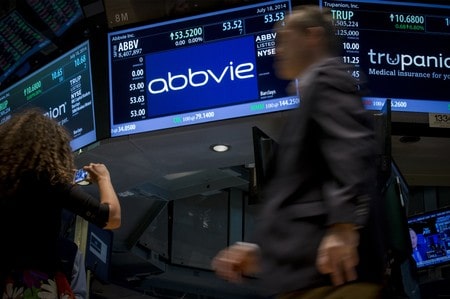By Tamara Mathias and Shivani Singh
(Reuters) – AbbVie Inc has priced its new rheumatoid arthritis treatment at $59,000 a year after gaining U.S. approval on Friday, a big boost for the drugmaker struggling with rising competition for Humira, its blockbuster therapy for the same condition.
A four-week supply of Humira, the world’s best-selling medicine, has a list price of about $5,174, amounting to more than $60,000 for a year.
However, the list price is not necessarily what patients actually pay as “out-of-pocket” costs vary based on the duration of the treatment and individual healthcare plans.
Humira brought in global revenue of $4.87 billion in the second quarter, but sales have been hit by competition from cheaper rivals in Europe, and AbbVie in June announced a deal to buy Botox-maker Allergan Plc for $63 billion to reduce dependence on the drug.
The company has signed deals to prevent cheaper versions of Humira, which also treats psoriasis, from entering the United States, its biggest market, until 2023.
The newly approved treatment, Rinvoq, belongs to a class of medicines known as JAK inhibitors that block inflammation-causing enzymes called Janus kinases and will be available later this month.
The drug, also called upadacitinib, was developed in the same Massachusetts facility where Humira was discovered, as the company sought to develop a treatment that was more effective in rheumatoid arthritis patients, Lisa Olson, who works in AbbVie’s immunology discovery team, told Reuters.
The FDA approval allows Rinvoq’s use in adults with moderate-to-severe rheumatoid arthritis in whom methotrexate – one of the first medicines prescribed to these patients – did not work well or could not be tolerated.
Rinvoq is set to compete with Pfizer Inc’s Xeljanz and Eli Lilly’s Olumiant.
Rinvoq’s label has a warning that flags risks of serious infections and lymphoma. In a notice, the FDA also said patients taking JAK inhibitors in general risked developing blood clots. (http://bit.ly/2KFUa5H)
AbbVie said it planned to offer a co-pay card that could reduce out-of-pocket costs to $5 per month for eligible, commercially-insured patients, as well as a patient support program.
The company is also studying Rinvoq as a treatment for other indications such as psoriatic arthritis, Crohn’s disease and ulcerative colitis.
Shares of the company rose 2.2% to $64.36 in afternoon trading.
(Reporting by Tamara Mathias, Shivani Singh and Manas Mishra in Bengaluru; Editing by Maju Samuel and Sriraj Kalluvila)


